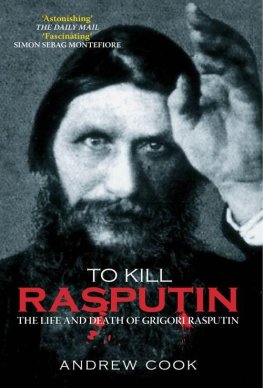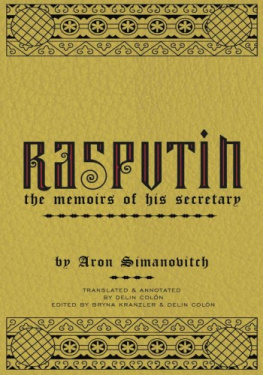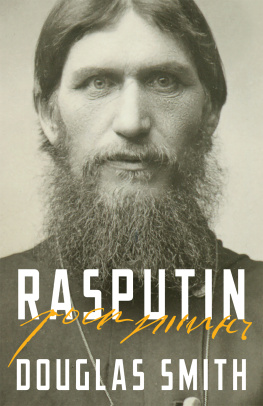GRIGORI RASPUTIN
A Life from Beginning to End
Copyright 2017 by Hourly History.
All rights reserved.
Table of Contents
Introduction
Grigori Rasputin was born in an obscure and poor Siberian village on January 21, 1869. The records of his early life are admittedly scarce, but from what we do know, the youth of Rasputin appears to be one that was mostly misspent. He was caught several times for petty theft, and he was widely recognized as a rabble-rouser who eschewed authority figures. This led to an eventual confrontation with these very figures of authority and the young Rasputins banishment to Verkhoturye Monastery.
Considered the Gateway to Siberia, this majestic monastery situated in the Ural Mountains served to change the trajectory of the young Rasputins life completely. During his stay at this monastery, he was introduced to a renowned holy man of the time, a church elder named Makary. It was from Makary that Rasputin learned to live a life of austerity, learning to give up liquor, smoking, and even meat.
But although a monastic lifestyle was impressed upon Rasputin during his stay at the monastery, he himself was not too impressed by the monastery as an institution. He considered the power structure of the monastery to be too coercive and that it used violence over people to keep them in line. So as paradoxical as it may seem, although he embraced some of the trappings of monastic life, Rasputin had decided that he did not want to live his life holed up in a monastery.
Rather than being locked away in a church, Rasputin wanted to travel. After leaving the monastery, his first destination was the Siberian outpost of Abalak, Russia. It was in this poor village that he met a woman by the name of Praskovya Dubrovina. Not much is known of Praskovya beyond the fact that she is estimated to be a couple of years older than Rasputin and the two were married shortly after they first met.
Rasputin and Praskovya went on to have several children, but it wasnt long before Rasputin was bitten by the traveling bug once again. Overcome with the urge to preach to the world, Rasputin kissed his family goodbye and hit the road. Although it is rumored that he went as far as Greece and Israel, it is not entirely clear where he traveled and what all he did during his pilgrimage.
We have second-hand accounts of Rasputin wandering like a mad monk through the countryside and the wilderness, walking like a man possessed for thousands of miles without stopping. Rasputin apparently traveled the world with complete ease, and he was ready to change the world upon his return.
Chapter One
From Peasant Monk to Royal Holy Man
When I go to confession I dont offer God small sins, petty squabbles, jealousiesI offer him sins worth forgiving!
Rasputin
Upon his return to his familys Siberian village of Pokrovskoye, Rasputins reputation as a staretsthe Russian term for a spiritual elderpreceded him. But a lot of controversy came along with his newfound acclaim. In fact, much of the town gossip seemed to center around a secret chamber that Rasputin had dug underneath his family home in which he held clandestine meetings with his most dedicated of followers.
It is said that most of his followers were young women of the village who it is believed ceremoniously washed the mad monk before every service he held. It is not entirely clear if this intimate washing had any sexual connotations to them or was just focused on his cleanness, but such rituals raised immediate suspicions nonetheless.
Others, however, have pointed out that much of these rumors were encouraged by the local priest of Pokrovskoye who didnt appreciate the fact that many of his parishioners were skipping out on his more traditional service for Rasputins special bible studies. Some researchers contend that part of the false mythology surrounding Rasputins teachings was created by such jealous peers in an effort to discredit him.
Whatever the case may be, Rasputin continued these secret meetings over the next few years, and his notoriety began to grow all over the Siberian plains. Riding this populist tide of support from his fellow peasants, by 1904 he washed up on the shores of Kazan, situated just over the Volga River. Here he was received as an enlightened healer who was especially adept at bringing calm to those who sought his aid.
It was said that he had an uncanny ability to relax his charges just by having them gaze into his seemingly hypnotic eyes, which he was supposedly able to dilate and contract at will. Due to his apparent success as a healer and counselor of the people, the Father Superior of the Seven Lakes Monastery just outside of Kazan produced a recommendation letter on his behalf, vouching for his good character and abilities, and sent it off to the Alexander Nevsky Monastery in St. Petersburg, Russia.
Here, the monasterys archbishop facilitated accommodation for Rasputin to attend the winter session of the St. Petersburg Seminary in 1904. It was here that the self-taught monk was officially recognized by the Orthodox Church and met several influential church leaders of the day. The most important of these contacts was the inspector of the seminary, a man named Theophanes. Archimandrite Theophanesas his official title with Russian Orthodox Church would bewas deeply impressed by Rasputin.
And despite the peasant monks near illiteracy at the time, Theophanes sensed Rasputin as an intuitively spiritual man with an incredible understanding of the divinity and the nature of the universe. This may seem like some pretty hefty praise to heap upon Rasputins shoulders, but Theophanes saw in Rasputin the perfect ideal of the wandering wise and holy prophet, with little in material possession, but immense wealth when it comes to internal knowledge.
Theophanes believed that Rasputin could use his deep understanding of life to penetrate the problems of others and coupled with his forceful personality could effect change for good. Along with such strong recommendations and testimony from his powerful benefactor at the seminar, the aristocracy of St. Petersburg began to take notice as well, intrigued by the peasant monk from the Siberian North who seemed to so easily understand the complex problems of their high society lives.
Invited to several gatherings, Rasputin developed a cult following and became a source of entertainment and interest; like some famed magician or carnival barker, he was soon a regular attraction at the parties thrown by the Russian elite. Just like other performers of his day, such as Harry Houdini and Charlie Chaplain, the name Rasputin quickly became en vogue with everyone in St. Petersburg.
It was while he was doing the aristocratic party circuit that Rasputin was introduced to the princess sisters, Milica (sometimes pronounced Militsa) and Anastasia. These two women were each married to a cousin of Tsar Nicholas, and of all the royal family, they seemed to be the most interested in the dark arts. Holding sances and meeting supposed holy men like Rasputin, they earned the nickname of the dark sisters.
It was from Milica and Anastasia that the meeting between Rasputin and the Russian tsar and tsarina was arranged on November 1, 1905. And it was here that Rasputin and world history would take a sharp turn, with him exiting the obscure existence of a monk on the fringes of society to forever entering into legend and lore as a permanent fixture at the royal court.
Chapter Two
Too Many Rasputins
Find a priest who understands English and doesnt look like Rasputin.













